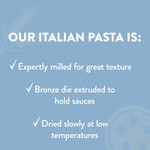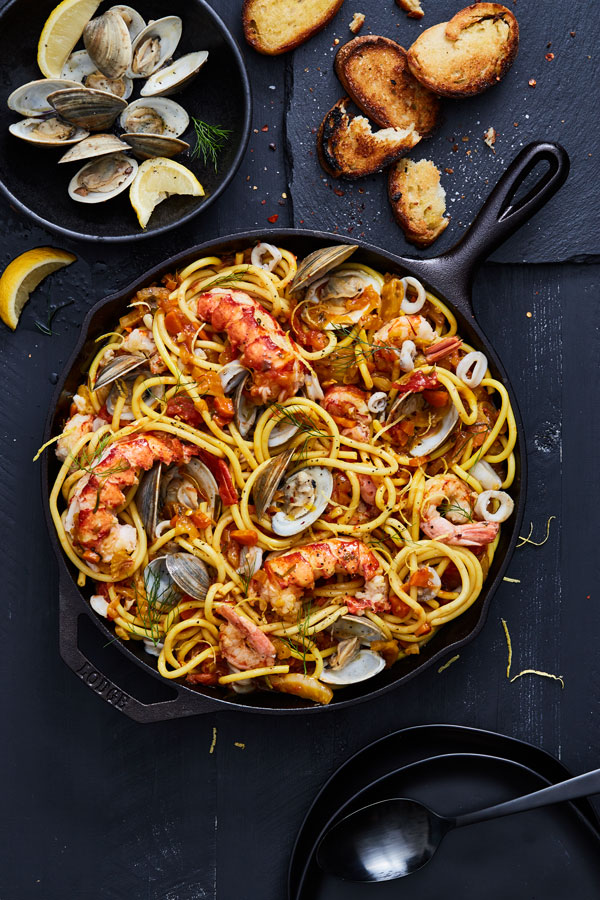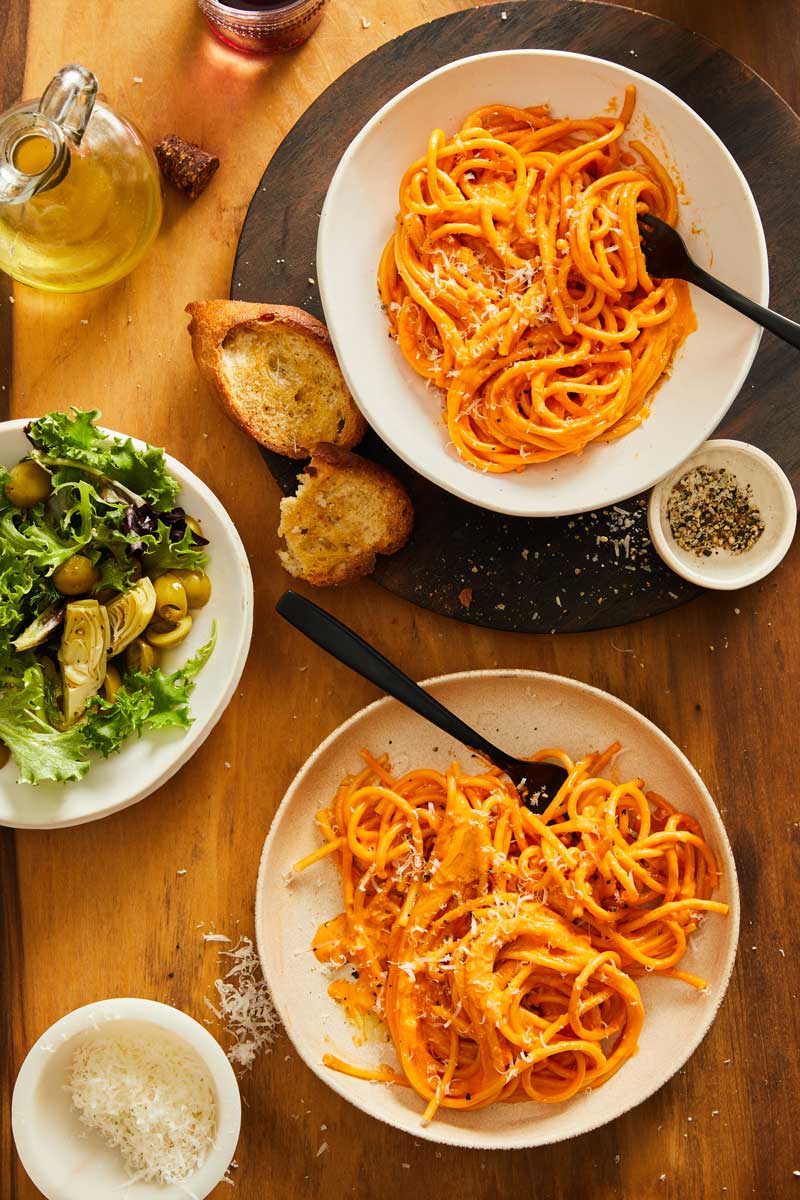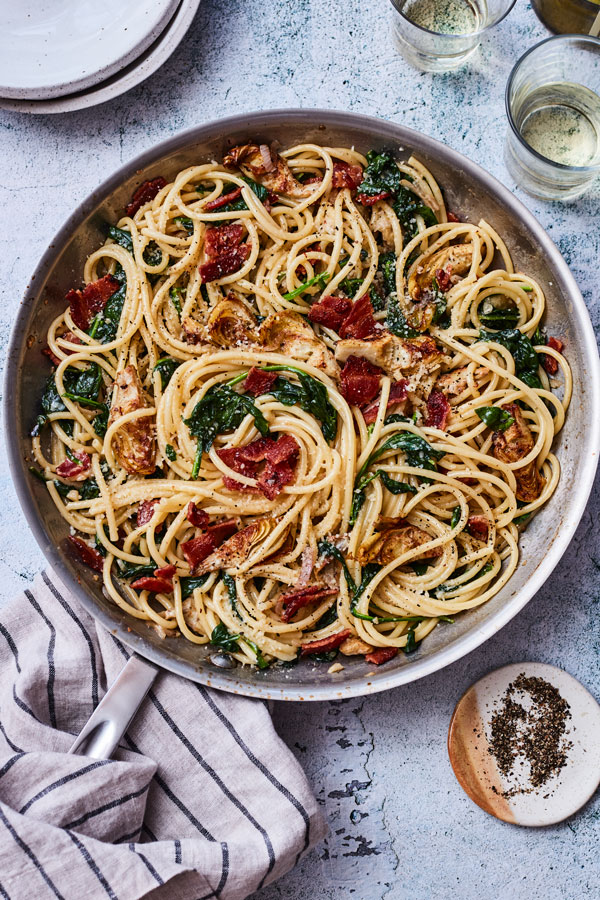Total Price:
Add to CartDescription
Originating in the Lazio region of Italy, Bucatini is a long cut of pasta named for the “hole” running down its center. This straw-like pasta easily sucks up lighter tomato and seafood-based sauces. Famous for its starring role in Roman classics like Amatriciana, Cacio e Pepe and Carbonara.
The art of making our pasta begins with the very best quality wheat. We carefully choose wheat with the highest gluten index, gluten content and protein content. All of these characteristics affect how the past cooks, as well as its taste and texture.
Our method respects the ingredients, preserving the pasta’s color, texture and aroma.
Kitchen and Usage Tips:
Because it is thicker than traditional cuts of pasta like spaghetti, It takes a little longer to cook.
Bucatini can absorb sauce more quickly and tend to dry out, so you may need to use slightly more sauce.
We recommend cooking Bucatini in a 5 qt. pot of boiling salted water. Be sure to always cook to ‘al dente’ to keep a firm center.
Frequently Asked Questions:
What is bucatini? Bucatini is a shape of Italian pasta that is most simply described as a thick, hollow spaghetti. It is a long, narrow tube of pasta named for the “hole” running down its center. The word “buco” in Italian means hole. The shape resembles a drinking straw. Bucatini is also sometimes referred to as “percatelli” in the regions of Abruzzo and Molise.
How do you pronounce bucatini? Boo-kah-TEEN-ee
Where does bucatini come from? The bucatini pasta shape originated in and around Rome, Italy. DeLallo Bucatini Pasta is made in a townn near Naples where pasta was born, at the beginning of the Amalfi Coast.
What makes bucatini unique (i.e. vs. spaghetti or long macaroni)? Bucatini is thicker than spaghetti, making room for that hollow center running throughout. While the two pastas are used in similar dishes, spaghetti gets coated with sauce, while bucatini's center hole also allows for the sauce to fill the pasta. Bucatini is more difficult to twirl on a fork than spaghetti.
Learn more about pasta shapes.
How is bucatini made? A blend of the durum wheat semolina flour is mixed with cool spring water to form the dough. This dough is then extruded through bronze dies to create the shape. The die has thin round circles cut into its surface to punch out the center of the long noodle. Bronze dies are used to create a rougher surface that better absorbs and captures sauces. The long hollow noodles are then hung to dry slowly at low temperatures to preserve pasta’s color, texture and flavor throughout the cooking process.
What is bucatini best for? It is best known for its starring role in classic Roman pasta dishes such as: Alla’ Amatriciana (a red tomato sauce with guanciale (pork jowl), Cacio e Pepe (a white sauce made with the pasta’s cooking water combined with pecorino romano and fresh cracked black peppercorns) Carbonara ( a sauce made of fresh eggs, pecorino romano and crispy pancetta or guanciale) and a simply prepared San Marzano tomato sauce.








DeLallo Manicotti is a large and lovable tube-shaped pasta that is made for stuffing to create cozy baked pasta dishes of the same name. Manicotti pasta is crafted with superior hard durum wheat that...

Ditalini Rigate, or Ditalini Pasta, are small tube-shaped pasta with ridges. Such tiny pasta is known as pastina. Where once tiny pasta shapes like Ditalini were known as just soup pasta, these small...

Hailing from Southern Italy, this fun springy pasta can be described as a twisted “corkscrew” with hole. As sturdy as it is whimsical, Cavatappi is ready to take on hearty sauces and chunky...

Popular in Roman cuisine, Fettuccine is a distinct pasta shape resembling wide “ribbons.” Fettuccine pasta is best known for its feature in the classic buttery Parmesan dish of Fettuccine with...











